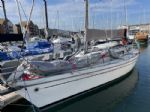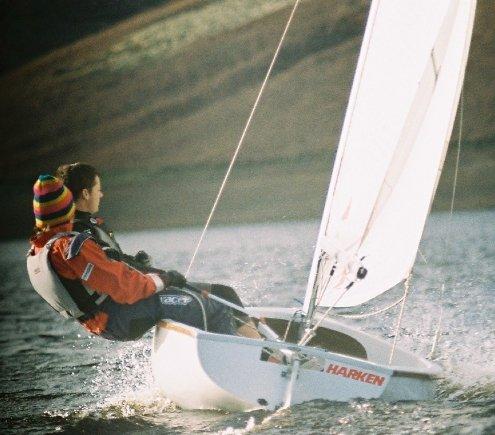












Boats for sale
| Laser 28 - Excellent example of this great design Hamble le rice |
 |
| Rossiter Pintail Mortagne sur Gironde, near Bordeaux |
 |
List classes of boat for sale |
Try this one... |
Post Reply 
|
Page <123> |
| Author | |||||
Brass 
Really should get out more 
Joined: 24 Mar 08 Location: Australia Online Status: Offline Posts: 1151 |
 Post Options Post Options
 Quote Quote  Reply Reply
 Topic: Try this one... Topic: Try this one...Posted: 07 Jun 13 at 6:06am |
||||
Nothing P did or failed to do or can do or not do will cause S to 'need to take avoiding action' so P is not failing to keep clear (Case 77) and P does not break rule 10.
1) If she stands on without any action P breaks no rule. There is no reason why she should take a penalty.
2a) If P touches the trailing sheet, which it seems inevitable she will, the above applies: she breaks no rule; there is no reason why she should take a penalty.
2b) If P touches the trailing sheet and there is no injury or damage, even if a protest committee found that S even though she was unaware that her sheet was trailing, could reasonbly possibly have avoided the contact, then S is exonerated under rule 14( b ).
3)
See above: it was not reasonably possible for P to avoid contact with the sheet, whether she attempted to take avoiding action or not. Unlike the IRPCAS rule referring to 'take action to avoid collision', rule 14 (main part) refers only to 'avoiding contact if reasonably possible'. If there is no action that P could have taken to avoid contact (as in this case) then she is not required to take any action at all.
OK, so the stopper knot on the sheet snags on P's centreboard, and the boats get pulled together and carnage ensues.
It would have been nice, and a tribute to her superb seamanship, if P had whipped up her centreboard, freed the trailing sheet, and sailed off into the sunset before there was any further contact, but she was under no obligation to do anything: it was not reasonably possible for her to avoid contact with the sheet: she has broken no rule at all. Even if the boats come together and there is injury or damage, then P has still not broken any rule and can not be penalised.
As for S, if there was injury or damage, if she remembers Case 77 which said that the right of way boat whose equipment moved unexpectedly out of position caused contact, she might be inclined to take a turns penalty. On the other hand, she might think that there is no way that the accidental streaming of her sheet astern, that she was unaware of 'caused' the contact, and might quite reasonably expect a protest committee to conclude that it was not reasonably possible for her to avoid contact and that she had not broken rule 14 either, in which case she might decide not to do any penalty turns.
|
|||||
 |
|||||
Rupert 
Really should get out more 
Joined: 11 Aug 04 Location: Whitefriars sc Online Status: Offline Posts: 8956 |
 Post Options Post Options
 Quote Quote  Reply Reply
 Posted: 07 Jun 13 at 12:07pm Posted: 07 Jun 13 at 12:07pm |
||||
|
Brass, the reason people started thinking about that would happen if this was deliberate is because it is a forum and we can - by thread creep standards, that is a pretty minor one.
|
|||||
|
Firefly 2324, Puffin 229, Minisail 3446 Mirror 70686
|
|||||
 |
|||||
Quagers 
Far too distracted from work 

Joined: 24 Oct 06 Location: United Kingdom Online Status: Offline Posts: 279 |
 Post Options Post Options
 Quote Quote  Reply Reply
 Posted: 07 Jun 13 at 2:00pm Posted: 07 Jun 13 at 2:00pm |
||||
Just covering all the angles as this is a natural question that someone might have after reading the answer to the original question. I made very clear the limited set of circumstance it would apply and if it was proved to be deliberate I absolutely feel a R2 penalty would be appropriate. It would be similar to the 'crew hikes out not in response to a gust to cause contact with a windward boat.' situation. Edited by Quagers - 07 Jun 13 at 2:04pm |
|||||
 |
|||||
Brass 
Really should get out more 
Joined: 24 Mar 08 Location: Australia Online Status: Offline Posts: 1151 |
 Post Options Post Options
 Quote Quote  Reply Reply
 Posted: 07 Jun 13 at 3:57pm Posted: 07 Jun 13 at 3:57pm |
||||
I acknowledge that Gordon has in the past chid me for a certain 'colonial robustness' in my approach to sportsmanship and fair play, but it's not a natural question to me at all. It seems to involve a primary assumption that one of our fellow sailors is a cheat. It smacks of a certain 'my sportsmanship is bigger than your sportsmanship' approach, or to say the least an exaggerated delicacy. That said, lets take a look at the issue as raised by responses to the OP in a little more detail.
As discussed with reference to cases 77 and 91 Port will break no rule by touching the trailing sheet. How then would deliberately trailing the sheet 'put port at a disadvantage'? Answer: it wouldn't. OK, suppose S had some half-smart idea of trapping P into breaking a rule. By deliberately trailing the sheet, then all my Case 77 worries about whether S 'caused' the contact go away: S deliberately trailing the sheet caused the contact: it was reasonably possible for S, by not deliberately trailing the sheet to have avoided contact. S broke rule 14, but as previously discussed, there being no damage or injury (and except in the rather unlikely event of the sheet snagging on S and drawing the boats together, damage being unlikely) S shall be exonerated in accordance with rule 14( b ). S, however, deliberately broke a rule with the intention of gaining an advantage. Well, we can search the RRS and the Case Book and we will not discover any general rule or interpretation that says anything special about deliberately breaking a rule. That said, I don't have too much trouble accepting that it's a recognised principle of sportsmanship and fair play not to deliberately break the rules with the intention of gaining an advantage. If we consult the RYA Guidance on Misconduct we discover that deliberately breaking a rule with the intention of gaining an advantage is:
There are a couple of problems with this. Firstly, it's all very well for us to talk in a scenario on a rules forum about what S does 'deliberately' and what S 'intends', but in the absence of the trusty Brain-o-Scope, it may be exceedingly difficult to prove these mental states in a protest hearing (and as I have indicated, in my opinion, extremely rude to our fellow competitors to suggest that they may be assumed). Remember the rule 2 requires that any alleged violation must be clearly established, and any rule 69 hearing must reach 'comfortable satisfaction' (Case 122). Secondly, RYA Appeal 2004/3 flatly says:
So, yes it's interesting and educational, if somewhat insulting to our fellow sailors, to examine how rule 2 might run in this case. |
|||||
 |
|||||
RS400atC 
Really should get out more 
Joined: 04 Dec 08 Online Status: Offline Posts: 3011 |
 Post Options Post Options
 Quote Quote  Reply Reply
 Posted: 07 Jun 13 at 5:55pm Posted: 07 Jun 13 at 5:55pm |
||||
|
If the port boat hailed the starboard boat to pull his sheet aboard, would starboard be obliged to do so?
I have in the past trailed a kite halyard on a keelboat to work the twists out of it, during a race. I have also done the same with a main halyard when coming ashore on a beach with waves. |
|||||
 |
|||||
RS400atC 
Really should get out more 
Joined: 04 Dec 08 Online Status: Offline Posts: 3011 |
 Post Options Post Options
 Quote Quote  Reply Reply
 Posted: 07 Jun 13 at 6:13pm Posted: 07 Jun 13 at 6:13pm |
||||
What rule has S broken by trailing a sheet exactly? Is it that different from trailing the lazy twiller? If S chooses to trail a warp, is P not obliged to keep clear of it, to the limit that this is possible? I accept that if you don't see the line until it's too late, it's not possible. But supposing S is not a dinghy but some retro cruiser-racer towing a walker log... Or my mate Roger who caught a few mackeral while winning a race back from the IoW..... I thought that deliberately breaking any rule to gain an advantage broke Rule 2? What else is the established principle of sportsmanship if it is not to attempt to play within the rules? |
|||||
 |
|||||
Brass 
Really should get out more 
Joined: 24 Mar 08 Location: Australia Online Status: Offline Posts: 1151 |
 Post Options Post Options
 Quote Quote  Reply Reply
 Posted: 08 Jun 13 at 2:24am Posted: 08 Jun 13 at 2:24am |
||||
If contact results from S deliberately trailing a sheet, hawser or fishing line, then S breaks rule 14 because it was reasonably possible for her to have avoided contact by not trailing the thing. What on earth is a twiller and why are you abusing it by calling it lazy?
[A] port tack boat shall keep clear of a starboard tack boat (rule 10). I suppose one could argue that a sheet is part of a boat, but a hawser is not, but I'm not attracted to that. P is obliged to keep clear of S, including any part of S that she is trailing behind her, regardless of whether it is reasonably possible for P to do so or not. Right of way rules are absolute rules: they are not subject to conditions. P is also obliged to avoid contact with S if reasonably possible (rule 14). In this scenario as fully explained in Case 77, Nothing P did or failed to do, or can do or not do will cause S to 'need to take avoiding action' so P is not failing to keep clear and P does not break rule 10. The trailing sheet or whatever, not being readily visible to P, it is not reasonably possible for P to avoid contact with it and P does not break rule 14.
In both those cases it's being done deliberately and the principles discussed above and in Case 77 can be applied. But I'm pretty sure trailing a fishing line is like flying an ensign: a certain signal that a boat is not racing <g>.
That's what a boat protesting under rule 2 needs to convince the protest committee. Edited by Brass - 08 Jun 13 at 2:26am |
|||||
 |
|||||
Quagers 
Far too distracted from work 

Joined: 24 Oct 06 Location: United Kingdom Online Status: Offline Posts: 279 |
 Post Options Post Options
 Quote Quote  Reply Reply
 Posted: 08 Jun 13 at 2:34am Posted: 08 Jun 13 at 2:34am |
||||
|
My personal opinion on this which is shaped by TR call A4 and case 73 is that if the mainsheet is trailed purely with the intention of causing contact or forcing port into a much larger duck than normal then that would be a R2 infringement. If its something the boat does every lap then there is more of an argument to be made.
I can't see how discussing a hypothetical question on an internet board is insulting to anyone, by discussing these sort of issues everyone learns how the rules apply in different situations and improves their knowledge out on the water. Which can in turn only be of benefit to all of us. Clearly "what if it was deliberate" was always going to be asked in relation to this question as it raises interesting points. Edited by Quagers - 08 Jun 13 at 2:35am |
|||||
 |
|||||
Brass 
Really should get out more 
Joined: 24 Mar 08 Location: Australia Online Status: Offline Posts: 1151 |
 Post Options Post Options
 Quote Quote  Reply Reply
 Posted: 08 Jun 13 at 7:19am Posted: 08 Jun 13 at 7:19am |
||||
I don't think TR Call A4 adds anything: it's just a short gloss on Cases 73 and 74. It does, however remind me that, while the normal RRS do not mention deliberately breaking a rule, rule C8.3( b ) does enable umpires to give an additional penalty for deliberately breaking a rule in Match Racing. Curiously this doen't seem to be repeated in Appendix D for Team Racing. I think the essence of Case 73 is the 'reaching out' and making contact when otherwise the give way boat is keeping clear. Thus, reaching out with a hand or extending an extendable bowsprit, or heaving a line, so as to make contact, when that action 'could have no other intention than to cause W to break [a right of way] rule' intentionally and avoidably breaks rule 14 and in deliberately breaking a rule to gain advantage breaks rule 2. The reservation in RYA Appeal 2004/3 that touching a boat that is so close that she is already breaking rule 11 seems to me valid and useful here. I don't agree that trailing a line, or say rigging a spinnaker pole to windward without a spinnaker set, in order to increase the 'envelope' of a right of way boat that a keep clear boat must keep clear around, as long as the equipment has been out of its normal position long enough for the equipment to have been seen and avoided breaks any rule. Case 91 says exactly that. There is a very limited number of rules that depend on a boat's equipment being 'in normal position' (Definition Clear Ahead, Clear Astern, Overlap, and Definition Finish). There is no other requirement concerning a boat sailing with her equipment in normal position in the rules.
Edited by Brass - 08 Jun 13 at 7:21am |
|||||
 |
|||||
Quagers 
Far too distracted from work 

Joined: 24 Oct 06 Location: United Kingdom Online Status: Offline Posts: 279 |
 Post Options Post Options
 Quote Quote  Reply Reply
 Posted: 08 Jun 13 at 9:43am Posted: 08 Jun 13 at 9:43am |
||||
|
And yet we never see this, when if this was the case it could confer a huge advantage.
You could rig a long pole to leeward for the start to guarantee a gap to accelerate into. In the situation here you can force back into a duck several BLs longer than necessary. These actions seem pretty unsporting to me and clearly the community agrees or we would see them out on the course. For me any placement of a piece of equipment with only the intention of causing contact or making it harder to avoid is no on. Edited by Quagers - 08 Jun 13 at 9:43am |
|||||
 |
|||||
Post Reply 
|
Page <123> |
| Forum Jump | Forum Permissions  You cannot post new topics in this forum You cannot reply to topics in this forum You cannot delete your posts in this forum You cannot edit your posts in this forum You cannot create polls in this forum You cannot vote in polls in this forum |
Bulletin Board Software by Web Wiz Forums® version 9.665y
Copyright ©2001-2010 Web Wiz
Change your personal settings, or read our privacy policy
Copyright ©2001-2010 Web Wiz
Change your personal settings, or read our privacy policy











 Printable Version
Printable Version Delicious
Delicious Digg
Digg Facebook
Facebook Furl
Furl Google
Google MySpace
MySpace Newsvine
Newsvine reddit
reddit StumbleUpon
StumbleUpon Twitter
Twitter Windows Live
Windows Live Yahoo Bookmarks
Yahoo Bookmarks Topic Options
Topic Options